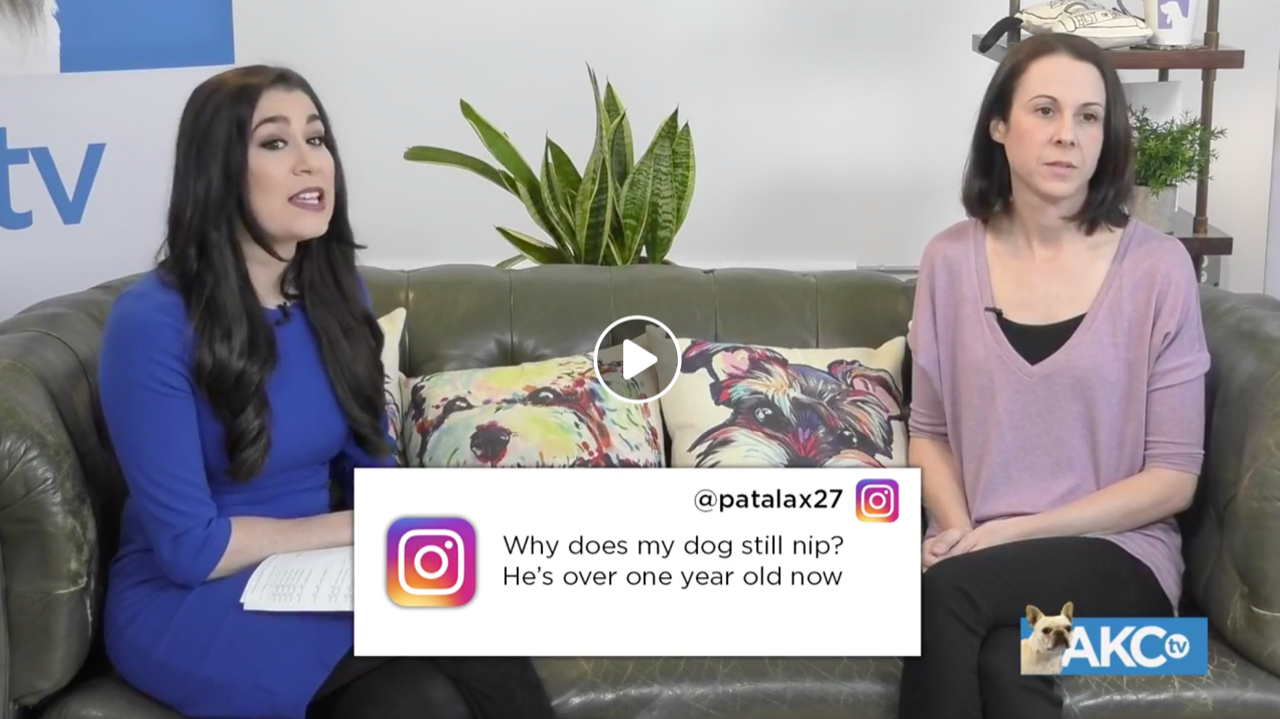|
Feeling stressed out lately? You're far from alone. We humans are getting better at understanding how anxiety affects us, and we are perpetually coming up with new and more effective ways to alleviate it.
But what about our dogs? Like us, our dogs can suffer from anxiety in both small and large ways. Most dog behavior consultants like me are getting increasingly concerned, as we have noticed a significant uptick in the number of anxiety cases we see. Daily tasks like going for walks, having guests over, hearing certain noises, or looking out the window can trigger some dogs' anxiety. When a dog responds to seemingly innocuous things in an anxious way, he/she may be suffering from Generalized Anxiety Disorder. The good news is that, as with humans, dogs can benefit from behavior modification training to reduce anxiety and give them happier, healthier lives. Watch my interview on AKC TV's Ask the Expert to learn the ins and outs of dog anxiety.
0 Comments
The most common question I now get sounds something like this: "I've been working from home and my dog is in heaven. Should I be worried about him having separation anxiety when I go back to the office?"
While every dog is different, there is certainly a chance your dog will be stressed out if you go back to long absences cold-turkey. And if your dog already has the tendency to cry when you leave, shadow you around the house, or be sensitive to changes in routine, the likelihood is even higher. Now is the time to prepare your dog for the inevitable shift in schedule, even if your only absences include getting the mail or taking out the garbage. Watch my recent appearance on AKC TV's Ask the Expert, full of tips for how to ease your dog back into a solitary lifestyle. If your dog struggles to be alone, consider an in-person or online lesson to start easing his stress. Earlier this week, I was the guest on Ask the Expert, a live program on AKC TV where people submit questions in real time for me to answer. Our topic was "why does my dog do that?" The questions ranged from serious ("Why is my dog growling at me?") to silly ("Why does my dog roll in goose poop?"). Check out the full episode below!
 To some dogs, everything is a chew toy. If your dog or puppy has an appetite for destruction, it’s important to address it sooner rather than later. While most of us humans see our home decor as something to preserve for many years, our dogs may have a different opinion. To them, nothing is more exhilarating than ripping a pillow apart, and chomping on an antique table leg is a great way to pass an otherwise boring day. Click Read More if you don't see the text below. When a veterinarian and a dog trainer get together, what do you think they talk about? (Hint, the #1 topic is probably "#1" and "#2.") I had the pleasure of sitting down with friend and veterinarian Kaarin Vekman, DVM, to play a little game we called, "Whom should you call first: your vet or a trainer?" As a trainer, I get a lot of questions about topics that should really be directed to a vet. Likewise, vets are often asked behavior questions that are more in a trainer's territory. Then there are other cases where vets and trainers can work together to tackle a dog's issue from both medical and behavioral angles. And so when your dog is having a problem, it can be difficult to know where to start. Our game covers issues such as house training, separation anxiety, puppy vaccinations, nutrition, aggression, and nail trims. Though we were both involved in creating the questions, we didn't discuss our answers ahead of time. This game was also a good test for Dr. Vekman and me. Prior to playing the game, I was worried we would have widely differing points of view and possibly end our friendship over the contentious "puppy vaccination" topic. And while we do look at the same issue from different angles, it turns out these differences do not lead to confusion or conflict; rather, educating owners from both a medical and behavioral perspective can give them a more well-rounded understanding of their dogs' conditions.
You adopted a puppy and took a whole week off to make sure he’s settled into his new home. Then, after your first day back to work, you find a note on your apartment door: “Your dog has been barking all day. Please make it stop.”
At this point, you might assume your dog has separation anxiety and your life is about to be turned upside down. True separation anxiety can be a difficult issue to deal with, but the good news is that many people who think their dogs have separation anxiety are mistaken. In this case, it’s good to be wrong! What looks like SA may actually be temporary stress when a dog comes to a new home, a surplus of doggie energy that is not being sufficiently burned, or plain old boredom while home alone. Click "Read More" if you don't see the rest of the text below. |
Welcome!Kate is a certified dog behavior consultant, certified dog trainer, certified Fear Free professional, certified dog parkour instructor, and award-winning author. Categories
All
Archives
January 2024
The views expressed on this website belong to Kate Naito and may not reflect the views of the agencies with which she trains.
|




 RSS Feed
RSS Feed